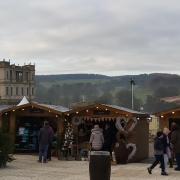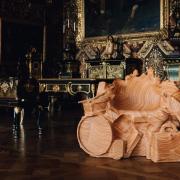Peter Seddon divines a seasonal message from festivities past...

It is that time again – the one that comes ‘but once a year’. Merry and bright, full of goodwill and cheer – Christmas is nearly here. And despite those eager to tell us that it ‘isn’t what it used to be’, the rituals and age-old traditions passed down the years will for many be heartily embraced once more.

But the well-worn doubter’s phrase begs the obvious question – what did it ‘used to be’? Were the ‘festivities of yore’ truly ‘better’ than now – or has little changed? Perhaps the 21st century version might even be an improvement on the glowing times of Christmas-past. The evidence needs weighing.
The warming anthology A Derbyshire Christmas (1992) by Robert Innes-Smith includes a poem for children by Richard Wragg. It recalls this simple winning formula from his long-remembered Derbyshire boyhood:
‘I got up and looked at my presents,
I was very excited
I was dancing round the Christmas tree.
We had a lot of Christmas cards
Hanging on a piece of string above the fire.
We took the balloons off the ceiling
And played with them.
Soon dinner time came.
We had chicken.
Then we had Christmas pudding and custard.
After dinner we played games.
Soon we had tea.
We had sandwiches for tea.
Then we had trifle.
After tea we were playing games again.
Snakes and ladders and blind man’s buff’.
Despite a tweak to the food and games – and those cards over the fire not at all ‘health and safety’ – this time-honoured routine remains widespread today.
Regressing further still, we all know that the lamp-lit Victorian days were even better. Or perchance we err. In his 1878 pre-Christmas message the editor of the Derbyshire Times addressed his readers thus:
‘The year drawing to a close will long be remembered as a most calamitous one. It began in anxiety and gloom, and is ending likewise, indeed for many people in misery and destitution.’
Hardly the most positive ‘goodwill message’ – but he explains more deeply: ‘That knotty problem the Eastern Question has left us as its legacy the Afghan War. The slaughters and nameless horrors which marked its cause will set apart 1878 in the memory. The year was also one of commercial disaster. The numerous bank failures have been such a shock to credit as to intensify the already existing depression in trade. Strikes and lock-outs have still further increased the stock of individual suffering which has at length assumed most serious proportions. And to intensify this calamitous condition, an early winter that bids to be unusually severe has now set in.’
He need only have added ‘what is to become of us all?’ for Christmas to be summarily cancelled. So is that really the idealised Victorian Christmas for which we longingly yearn? Some things seem horribly familiar – as that celebrated Christmas stylist Dickens might well remind us – ‘Hard Times’ are nothing new.
So much for newspaper editors. Might a literary figure be more lyrical? Thank goodness for Alison Uttley (1884-1976) – her Victorian childhood on the family’s Derbyshire farm restores some faith: ‘Then came Christmas Eve, the night of mystery, when we hung up our stockings. As I lay in the soft bosom of the great feather mattress, the warm bed enfolded me, luring me to sleep. Dreams of a bulging stocking and big fairy tale book fluttered before my eyes. Sometime in the night “he” would pull up his eight antlered steeds on our snow-covered lawn and come down “our” chimney. This was one of the miracles on the Holy Night, when the Infant Christ was born – when great things happen.’
Nor was this sentiment a female preserve. Sir Osbert Sitwell (1892-1969) – who spent much of his life at Renishaw Hall in Derbyshire – wrote when in his fifties: ‘For those who are no longer children, Christmas, whether they enjoy it or not, must inevitably be a brief period of nostalgia. One eve of Christmas some years ago, when I woke in the darkness of the night, a scent of snowdrops assailed me, and it seemed suddenly that I had come a long and tiring way from the point at which I started. As I lay there the Christmases of my childhood loomed up at me like beads on a chain…or snowdrops, gathered in a bunch.’
Sir Osbert was not a complete Christmas devotee – for he also recalled some quite austere and troubled ones – but he appeared to understand its mysterious allure. And perhaps wistfully to regret that he hadn’t always grasped it.
But his older sister truly pops the balloon. On 20th December 1947 Dame Edith Sitwell (1887-1964) wrote from Renishaw to a fellow poet – ‘This is just to wish you a very happy Christmas and New Year. Personally I loathe Christmas, in spite of being very greedy. But in the New Year, one always hopes it can’t be quite as bad as the previous one, although one’s hopes are never realised.’ In another letter she signs off... ‘Best wishes for Christmas – I hope you gargle and take great care against the flu.’
A poet’s view – but scarcely poetic. Literature provides a fellow professed ‘abstainer’ in Dame Edith’s contemporary D.H. Lawrence (1885-1930). When living at ‘Mountain Cottage’ in Middleton-by-Wirksworth in 1918 he wrote gloomily in Christmas letters: ‘It snowed yesterday, and the dark valley was white. But it melted. We are going to my sister’s in Ripley on Christmas Day, if ever I get so far – having got a bad cold, under which I crawl dismally. The weather is very dark and nasty, and Christmas is an institution that really should be abolished. I don’t want to hear of it – it wearies me.’ Lawrence finishes one greeting – ‘I don’t know that my wishes for a festive Christmas are worth much, but here they are.’
Lawrence seems a perfect candidate to strike from ‘the card list’ – yet when ‘the day came’ his Ripley revels hit the mark: ‘My God what masses of food. Turkey, tongues, roast loin of pork, sausages, pork pies, mince-pies, dark cakes covered with almonds, cheese-cakes, lemon-tarts, jellies – all with whisky, gin, port wine, burgundy, and muscatel. It seems incredible. Then charades, the old people playing harder than the young ones – we lit the tree, drank, sang and roared – Lord above.’ Then in true Lawrence style the Christmas lights go out – ‘If only one hadn’t all the while a sense that next week would be the same dreariness as before... I feel caged.’ As tortured souls go, Lawrence tops the tree.
The Christmas ‘guisers’ who long ago did the rounds of Derbyshire villages would have been prudent to give D.H.L. a wide berth. In Castleton the door-steppers adopted the guise of ‘a butcher, a woman, an old man with a blackened face, and a ram or ‘tup’ – enacting for a few coppers a symbolic but rather gruesome blood-letting routine.
On 21st December – the day of St Thomas the ‘doubting’ Apostle – the ‘Thomassers’ were also widely abroad. Poor women and children of the parish called on the ‘better-off’ seeking ‘alms’ – or else a prank might result. It was said that Quarndon householders rarely gave more than a few apples – while people in Hazelwood complained to teachers that the pesky urchins ‘ought to be in school’. Although ‘Thomassing’ may have ceased, we’ll still get those sundry Christmas callers – if benevolence fails, there’s always cowering in the kitchen until the coast clears... deny it ye who can!
It’s the ‘carollers’ who have prevailed longest – three centuries ago the ‘Tideswell Singer’ Samuel Slack delivered a hearty repertoire, not always of a strictly religious nature. Many verses shamelessly encouraged seasonal revelry – but a 17th century one gave a salutary reminder of the solemn character of Christmas: ‘All ye that are to mirth inclined, Consider well and bear in mind, What our good God for us hath done, In sending His beloved Son.’
That chastening note seems a telling one on which to sum up the case. Which gets the cracker prize – Christmas now or then? Shall we raise a cheery glass – or refuse to wear the paper hat? Evidence has come from both camps, but given the fundamental meaning of Christmas it would surely be wise to fully embrace our Christmas 2013. Let’s recall to the witness box the gloom-laden editor of the Derbyshire Times – later in his 1878 missive he found his true heart:
‘Let us hope that at the Christmas glad festival we may all feel more strongly the ties of our common brotherhood. If instead of fighting for our own hand – which of late has been too much the animating spirit – we learn that we are all members of one great family, then this Christmas will bring in its trail unspeakable blessings.’
A wise man after all – the message still holds good. So however and wherever the festive season finds you – quiet or uproarious, home or abroad – drink deep of its spirit, gargle well, avoid the flu... and ‘Have a good one’.



























